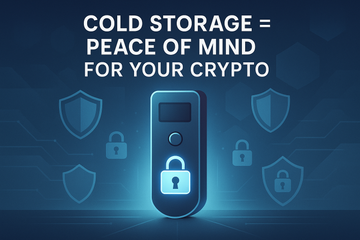Cryptocurrency wasn't something you stumbled into; you were drawn to it—like a moth to a flame, but in a good way. Whether you've been in the game since Bitcoin was just a fledgling or you're a more recent convert, you've probably realized that protecting your digital assets is priority number one. You’ve heard the horror stories—folks losing fortunes because they didn't secure their crypto. How can you avoid being one of those cautionary tales? Enter cold storage.
What Is This 'Cold Storage' You Speak Of?
Let's cut to the chase. Cold storage, in the context of cryptocurrencies, isn't about some freezing vault hidden in an icy bastion. It's much simpler. Cold storage refers to keeping your cryptocurrency offline, away from the prying eyes of hackers and digital kleptomaniacs. While hot wallets—those connected to the internet—are convenient, they unfortunately leave your crypto just a tad more vulnerable. Cold storage, on the other hand, means your private keys are detached from the online world, thus diminishing the risk of any unauthorized access.
Different Ways to Store Your Crypto in the Cold
No two cryptocurrency investors are exactly alike, and thankfully, the methods for cold storage are as varied as the people who use them. Here’s a quick rundown:
- Hardware Wallets: This is the darling of the cold storage universe. Fancy a small USB device? That's your hardware wallet. Brands like Trezor and Ledger have made a name for themselves in this space. These gadgets securely store your private keys offline, but with the perk of ease when you decide to trade or transfer your assets.
- Paper Wallets: Old school? Perhaps, but they work. You generate a pair of keys offline and jot them down on a piece of paper. No digital footprint, no problem. Just don't spill coffee on it!
- Air-Gapped Computers: Think of them as your personal crypto fortresses. An air-gapped device is never connected to the internet. You store your private keys here, adding a layer of safety few can argue with.
Hardware Wallets: The Star of the Show
If cold storage had a best-in-class, it would probably be the hardware wallet. Brands like Trezor and Ledger have nailed the art of keeping things simple yet supremely secure. These gadgets can act as your bridge between the online and offline worlds. Want to transact? Simple. Just plug it in, punch in your PIN, and you're good to go.
Convenience Meets Security
Here's where hardware wallets shine—convenience. While old school can be cool, the modern crypto investor values convenience just as much as security. Imagine not having to fiddle around with resetting paper wallets or figuring out whether the air-gapped computer you've stashed away still works. These devices offer a seamless way to transact without sacrificing that all-important safety net.
Why Cold Storage Isn't Just for the Paranoid
Hold on, you might think—I'm not hoarding a million dollars in crypto. Why should I even bother with cold storage? Fair question, my friend. But here's the thing: if it's yours and you want to keep it that way, it's worth safeguarding. The crypto world can be a bit like the Wild West at times, and having a reliable sheriff in your pocket—in the form of a hardware wallet—can make all the difference.
Peace of Mind: Priceless
Consider it the insurance policy you didn’t know you needed. A bit melodramatic? Maybe. But in reality, having your assets tucked away safely is a different kind of reassurance. It's peace of mind knowing no random hacker can wake up one morning and decide to help themselves to your stash.
But Is It Foolproof?
Nothing is. Even in the world of cold storage, user error looms as the ever-present elephant in the room. Forget your PIN? Lose your recovery phrases? Yeah, that could spell trouble. But these hurdles aren't insurmountable. As long as you back up your recovery phrases and keep your devices secure, you’re already leagues ahead. Crypto might be digital gold, but unlike its physical counterpart, it's something you can entirely safeguard with a little preparation.
Navigating the Psychological Game
Crypto security isn't just about tech. It's very much a mental game. Having cold storage in place not only secures your assets but also helps you resist the temptation to trade impulsively, knowing full well that accessing your funds isn’t just a click away. Talk about a way to keep your investing strategy steady!
Wrapping It Up
So, there you have it. Cold storage may not sound as thrilling as a new altcoin launch, but its significance can't be overstated. Whether you're rolling with a Trezor or still clutching a paper wallet, you've taken a mighty step towards securing your financial future. The wild crypto ride may continue to surprise us, but one thing's for sure: when you've got your digital assets locked up tight, you're free to dive into the market with fewer worries on your mind.











